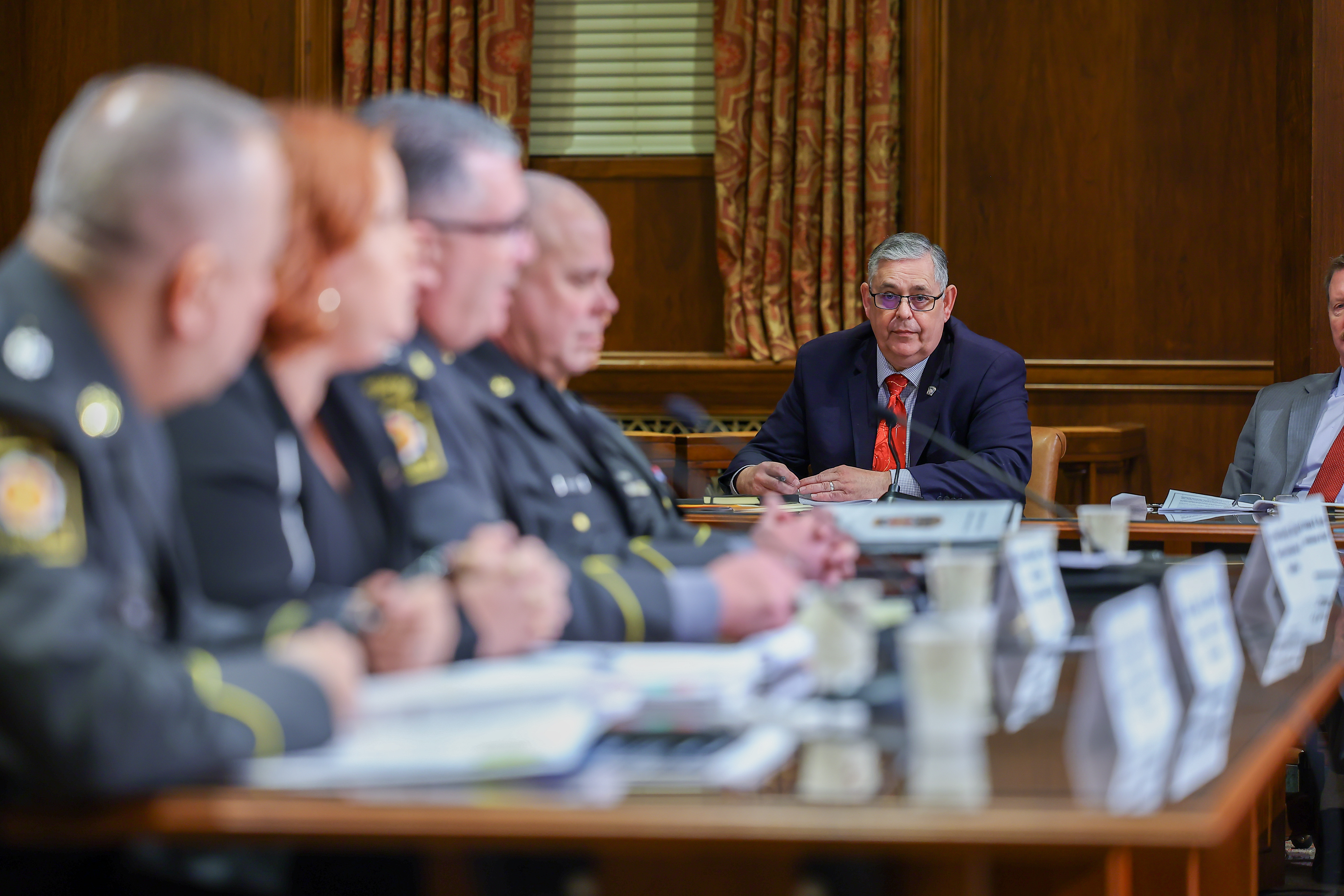
|
||||
|
In this Update:
Senate Concludes First Week of Budget HearingsOver the past week, I participated in Senate Appropriations Committee budget hearings, where I raised key concerns about Gov. Josh Shapiro’s proposed $51.5 billion spending plan, which would increase state spending by more than $3.6 billion. The Independent Fiscal Office projects a much different financial outlook than the administration, highlighting a potential $27.3 billion shortfall over the next five years. The Department of Revenue hearing focused on the inflated revenues Shapiro used to balance his spending proposal. In the proposed state budget, many government costs are not projected out for five years as constitutionally required. I challenged Revenue Secretary Pat Browne to account for this irresponsible lack of information. Additionally, I pressed him on proposed changes to unused tax credit programs and a 52% tax on skill games that nonprofits rely on for fundraising. Once again, there were plenty of “I don’t know” answers, with no written plans coming from Shapiro’s appointed executive branch secretaries on how to pay for it all. Balancing Shapiro’s budget would require elimination of the state’s entire existing fund balance of nearly $3 billion and a transfer of $1.6 billion from the state’s emergency savings, known as the Rainy Day Fund. If left unchecked his plan would cause serious financial issues. During the Pennsylvania State System of Higher Education (PASSHE) and Pennsylvania Higher Education Assistance Agency (PHEAA) budget hearing, I requested an update on the ongoing restructuring of state system schools from Interim Chancellor Christopher Fiorentino. Given steep declines in enrollment and to responsibly minimize student debt, I also raised concerns about prevailing wage requirements for state system construction projects and any potential efforts to help students graduate on time. During the Pennsylvania State Police (PSP) budget hearing, I asked Commissioner Christopher Paris for specifics about efforts to combat human trafficking. I also questioned him about whether the PSP is partnering with Immigration And Customs Enforcement (ICE) to enforce federal immigration laws across the Commonwealth. At the Department of Health budget hearing, I asked Secretary Dr. Debra Bogen about their 9.7% budget increase and why more isn’t being done to prioritize rural maternal health. This issue deserves greater focus and funding. My follow-up question to Secretary Bogen focused on whether her department is tracking the increase in schizophrenia among medical marijuana patients. Understanding these health impacts is critical as the program expands and – especially – with Shapiro pushing for the improbable legalization of recreational marijuana. During the Pennsylvania Department of State budget hearing, I asked Secretary of the Commonwealth Al Schmidt whether he’s hired the voter roll analysts whose salaries were included in the budget, why the department requested level funding, and for an update regarding the SURE system. Last, but not least, I questioned Pennsylvania Department of Transportation (PennDOT) Secretary Michael Carroll about why the governor’s budget slows down the phasedown of State Police costs from the Motor License Fund and what losing $375 million means for PennDOT projects over the next five years. I also had the opportunity to express several constituent concerns directly to Secretary Carroll, including does PennDOT pay for department vehicles, insurance or maintenance and if SEPTA customers should be solely responsible for paying maintenance costs? Find the hearings schedule, livestreams of budget hearings, daily recaps and video from prior hearings at PASenateGOP.com or follow along on my home page and YouTube channel. Majority Policy Committee Rides Along with Philadelphia PoliceTo better understand the challenges and dangers faced by law enforcement in Philadelphia, Senator Joe Picozzi (R-5) recently invited the Senate Majority Policy Committee to ride along with the Philadelphia Police in Kensington. During the four-hour session, we reviewed the situation confronting officers who patrol the area every day, including new initiatives by Mayor Cherelle Parker and City Council which are beginning to make improvements, after years of decline in the community. In addition to our discussions with law enforcement, we toured nearby Riverview Wellness Village (pictured above). Riverview provides housing and special services to help those suffering from drug use build sustainable habits for long-term recovery. They are now in the process of adding more beds and workforce development initiatives. Public safety remains a top priority across Pennsylvania, and we must continue working together to support law enforcement, strengthen our communities, and create safer neighborhoods for all. Thank you to Sen. Picozzi for organizing this important discussion and to the Philadelphia Police Department for their commitment to public safety and recovery. Support for Veterans Struggling with Substance Use
Adapting from military life to civilian life comes with serious challenges. Most veterans, with the support of their loved ones, overcome these difficulties. Others, sadly, resort to using substances as a coping mechanism and develop substance use disorder. More than one in 10 veterans have been diagnosed with a substance use disorder, which is higher than the general population. Help is available for veterans, family members and their advocates at 1-800-662-HELP (4357). Find local treatment options here. The Pennsylvania Department of Military and Veterans Affairs is active in communities throughout the state to connect troubled veterans to the resources they need for recovery. In a partnership with the Pennsylvania Department of Drug and Alcohol Programs, the state agencies work together to provide supportive services that are person-centered and focused on achieving overall wellness. Tips to Protect Your Family in a Power Outage
More than just an inconvenience, power outages can also present safety threats. In extreme cold temperatures, do not use a gas stove or oven to heat your home as it increases the risk of carbon monoxide poisoning, fires and burns. It’s best to go to a community location with power – particularly for those at greatest risk. Another concern is keeping food at the proper temperature. Keep freezers and fridges closed; a fridge will keep food cold for about four hours, and a full freezer will maintain the temperature for about 48 hours. Dispose of food if the temperature exceeds 40 degrees. Find out how long refrigerated medication can be stored at higher temperatures and contact your doctor for a new supply if necessary. Generators can minimize the challenges associated with power outages, but they present their own risks if not used properly. Read more about how to use them safely to prevent carbon monoxide poisoning and other hazards. Staying Safe in Winter’s Cold Temps
Not only are the cold temperatures we’ve been experiencing unpleasant, they can also be quite dangerous when frostbite or hypothermia take hold. If someone’s temperature is below 95 degrees, it’s important to seek medical attention immediately. When body temperature is too low, brain activity is compromised and the victim is unable to think clearly or move as usual – which makes it difficult for them to know they need help or get it if they do. Knowing the risk factors and warning signs can help to prevent frostbite and hypothermia. The Centers for Disease Control and Prevention offers helpful information about how to stay safe in the winter.
For anyone who hasn’t already signed up to receive my mission reports, you can get on the e-newsletter mailing list here. |
||||
|
||||






Want to change how you receive these emails? 2025 © Senate of Pennsylvania | https://senatordush.com | Privacy Policy |





